The Facebook/Cambridge Analytica controversy swept the news this week.
To summarize it quickly– a researcher gathered the data of up to 50 million Facebook users using a personality survey app back in 2014.
Facebook's current settings give third-party apps a lot of freedom to gather info and FB was aware of the actual data gathering. It's rumored that the data was passed on Cambridge Analytics who used it for ad targeting in the 2016 US election though the company denies the allegation. As the investigation unfolds over the next few weeks, we'll learn more.
Now it seems likely that many other apps have been doing the same thing for years. So what does this mean for you?
It means that Facebook and third-party developers have been using your data in a way you may not be aware of. That's why today, I'm going to show you some ways to take back your privacy.
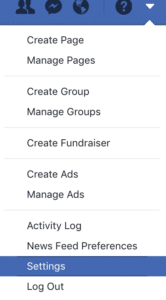 In the left-hand side menu in General Settings, select Apps.
In the left-hand side menu in General Settings, select Apps.
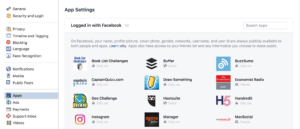 All Facebook apps have access to your name, profile pic, cover photo, gender, network, username, user id, friends list, and any other public info.
You can control how much other info each app has by clicking on the pencil icon next to it.
All Facebook apps have access to your name, profile pic, cover photo, gender, network, username, user id, friends list, and any other public info.
You can control how much other info each app has by clicking on the pencil icon next to it.
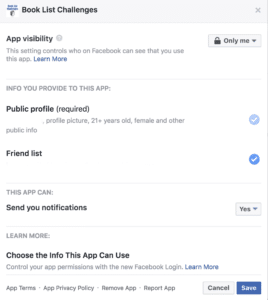 You can delete each app by clicking on the x icon– I found this useful for random quiz apps. Note that deleting an app doesn't delete the data they've already gathered. To do this, you need to contact the developer of each app.
Just how much access these apps have to our info (and how difficult it is to get rid of it) is a bit unnerving. That's why in future, it may be wise to think about the kind of info an app has access to before you download it– I know I will.
You can delete each app by clicking on the x icon– I found this useful for random quiz apps. Note that deleting an app doesn't delete the data they've already gathered. To do this, you need to contact the developer of each app.
Just how much access these apps have to our info (and how difficult it is to get rid of it) is a bit unnerving. That's why in future, it may be wise to think about the kind of info an app has access to before you download it– I know I will.
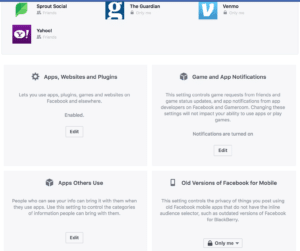 This feature lets you sign into third-party apps using your Facebook account– like ordering pizza from Dominos by signing in with your Facebook account. This integration makes things easy and convenient.
But, it also means that these third-party apps get access to your data. If you are willing to give up the convenience for privacy, you can disable the platform completely and revoke all permissions.
This feature lets you sign into third-party apps using your Facebook account– like ordering pizza from Dominos by signing in with your Facebook account. This integration makes things easy and convenient.
But, it also means that these third-party apps get access to your data. If you are willing to give up the convenience for privacy, you can disable the platform completely and revoke all permissions.
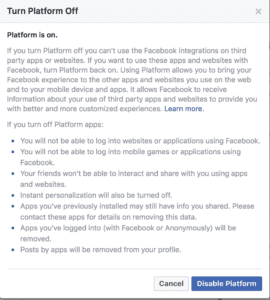 This option is on the nuclear side, but it's a step worth considering if you want to be more aggressive about protecting your privacy.
This option is on the nuclear side, but it's a step worth considering if you want to be more aggressive about protecting your privacy.
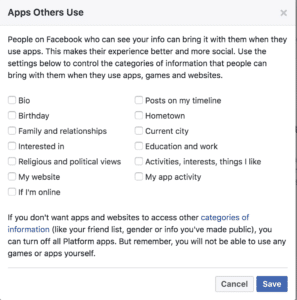 Click on each tick to control what kind of data can be shared.
Click on each tick to control what kind of data can be shared.
Why we give up our privacy
We give up our privacy for two main reasons– entertainment and convenience. Apps give us both of those things but it's time to consider the cost.Protecting yourself from third-party apps
Do you know just what kind of info third-party apps have access to? Let's take a look! Head over to your Facebook account and click on Settings. In the left-hand side menu in General Settings, select Apps.
In the left-hand side menu in General Settings, select Apps.
 All Facebook apps have access to your name, profile pic, cover photo, gender, network, username, user id, friends list, and any other public info.
You can control how much other info each app has by clicking on the pencil icon next to it.
All Facebook apps have access to your name, profile pic, cover photo, gender, network, username, user id, friends list, and any other public info.
You can control how much other info each app has by clicking on the pencil icon next to it.
 You can delete each app by clicking on the x icon– I found this useful for random quiz apps. Note that deleting an app doesn't delete the data they've already gathered. To do this, you need to contact the developer of each app.
Just how much access these apps have to our info (and how difficult it is to get rid of it) is a bit unnerving. That's why in future, it may be wise to think about the kind of info an app has access to before you download it– I know I will.
You can delete each app by clicking on the x icon– I found this useful for random quiz apps. Note that deleting an app doesn't delete the data they've already gathered. To do this, you need to contact the developer of each app.
Just how much access these apps have to our info (and how difficult it is to get rid of it) is a bit unnerving. That's why in future, it may be wise to think about the kind of info an app has access to before you download it– I know I will.
Disable third-party signups
If you scroll further down in Apps, you'll see Apps, Websites and Plugins. This feature lets you sign into third-party apps using your Facebook account– like ordering pizza from Dominos by signing in with your Facebook account. This integration makes things easy and convenient.
But, it also means that these third-party apps get access to your data. If you are willing to give up the convenience for privacy, you can disable the platform completely and revoke all permissions.
This feature lets you sign into third-party apps using your Facebook account– like ordering pizza from Dominos by signing in with your Facebook account. This integration makes things easy and convenient.
But, it also means that these third-party apps get access to your data. If you are willing to give up the convenience for privacy, you can disable the platform completely and revoke all permissions.
 This option is on the nuclear side, but it's a step worth considering if you want to be more aggressive about protecting your privacy.
This option is on the nuclear side, but it's a step worth considering if you want to be more aggressive about protecting your privacy.
Apps others use
People who have access to some of your Facebook info can give access to it to certain apps without really realizing. You can revoke that access by click on Apps Others Use. Click on each tick to control what kind of data can be shared.
Click on each tick to control what kind of data can be shared.



